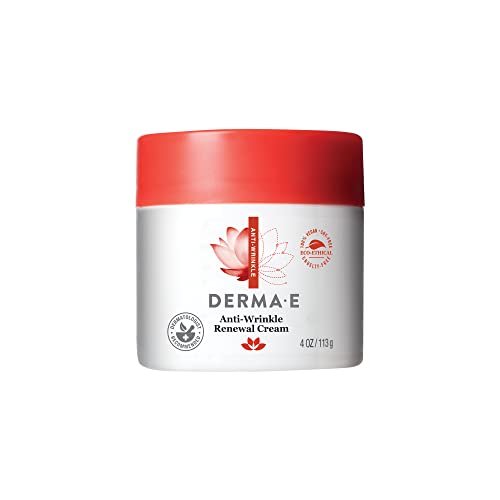
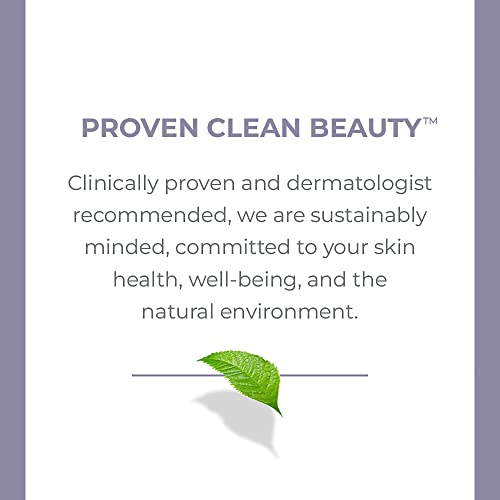
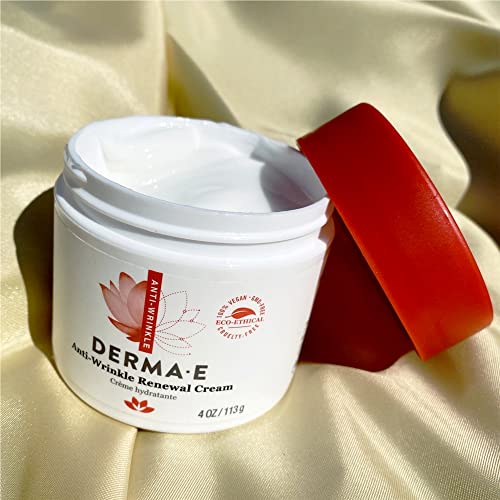
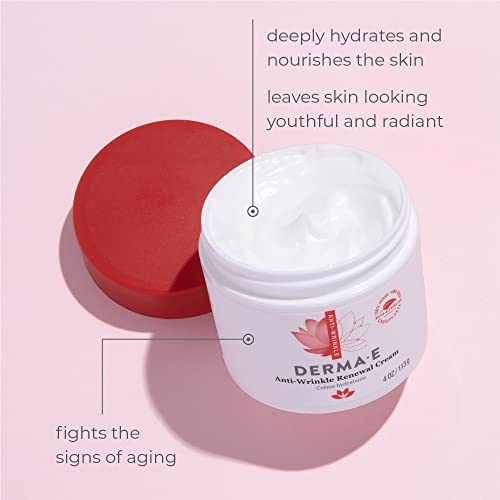
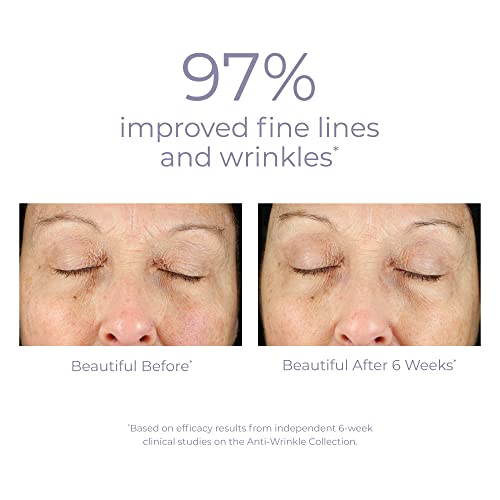
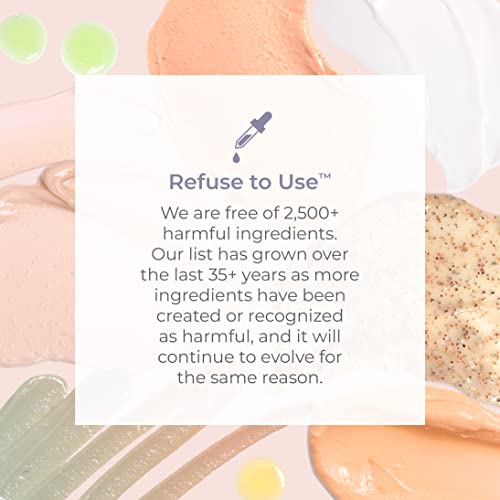
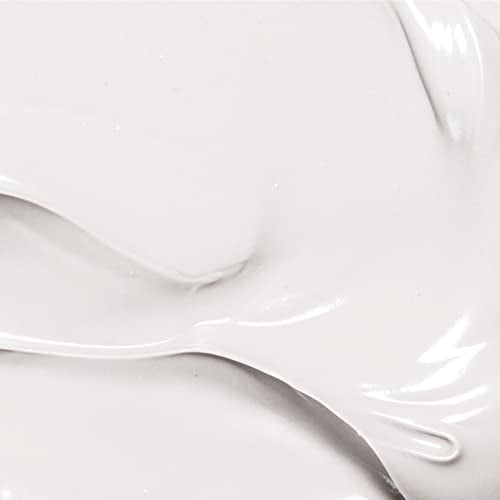
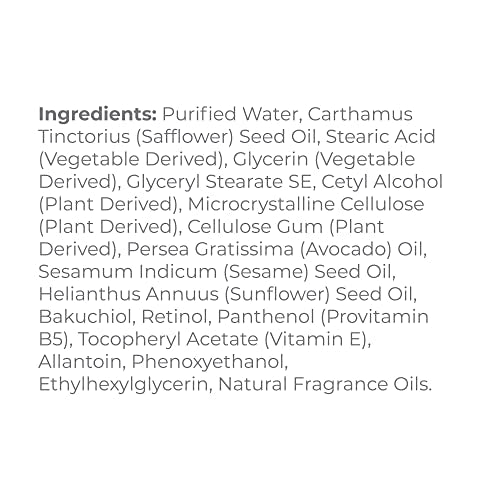
DERMA-E Anti-Wrinkle Renewal Cream - Nourishing Vitamin A Moisturizer, Vegan - 4 oz


Retinol (Vitamin A)
High RiskRetinol (vitamin A) is a naturally occurring substance primarily known for its role in skin health, often included in products aimed at improving skin texture and reducing signs of aging. It functions as a potent ingredient in skincare formulations, enhancing cellular turnover and promoting collagen production.
Sustai Insights
Retinol offers functional benefits such as enhancing skin absorption and improving skin appearance through increased turnover and collagen synthesis. However, its usage is associated with high concerns regarding developmental and reproductive toxicity and potential irritation. Environmental risks include its contribution to pollution, while regulatory bodies impose strict usage restrictions. Overall, the risk level is assessed as high, necessitating careful consideration in its application and the exploration of safer alternatives.
Retinyl Palmitate (Vitamin A Palmitate)
High RiskRetinyl palmitate, also known as vitamin A palmitate, is an ester of retinol and palmitic acid. It serves primarily as a skin-conditioning agent, promoting skin health and rejuvenation through its role in cellular turnover and differentiation. This ingredient is commonly used in cosmetic formulations.
Sustai Insights
Retinyl palmitate offers functional benefits such as enhancing skin texture and providing anti-aging effects. However, it is associated with high developmental and reproductive toxicity concerns, while also posing moderate risks for carcinogenicity. Environmentally, it may contribute to pollution and bioaccumulation. Regulatory bodies have imposed use restrictions due to these health risks, leading to an overall high-risk assessment. Safe usage practices are essential, and alternatives like retinol or plant-derived vitamin A sources may be considered.
Thuja Occidentalis (Arborvitae)
Medium RiskThuja occidentalis, commonly known as arborvitae, is a coniferous tree native to North America. It is often used in cosmetics and personal care products for its potential antimicrobial properties and as a fragrance component. Its essential oil is extracted for various applications in aromatherapy and traditional medicine.
Sustai Insights
Thuja occidentalis offers functional benefits, including antimicrobial properties and use as a natural fragrance. However, it may pose moderate allergenic risks and is not associated with significant health concerns like carcinogenicity or reproductive toxicity. Regulatory assessments indicate low restrictions on its use. Environmental impacts include potential for irritation and moderate toxicity to aquatic life. Overall, its risk level is categorized as medium, suggesting careful consideration during usage. Alternatives include other plant-based oils with similar benefits but lower allergenic potential.
Phenoxyethanol
Medium RiskPhenoxyethanol is a preservative used in cosmetics and personal care products to prevent microbial growth and extend shelf life. It is commonly found in formulations such as lotions, creams, and serums.
Sustai Insights
Phenoxyethanol serves effectively as a preservative, ensuring product stability and safety by inhibiting microbial growth. It is considered to have low health risks regarding carcinogenicity, allergies, and reproductive toxicity. However, moderate use restrictions exist, and regulatory bodies have advised caution in specific applications. Environmental concerns include its potential as a pollutant, although it is not highly bioaccumulative. Overall, the ingredient presents a medium risk level, with safe usage practices recommended and alternative preservatives available for those seeking greener options.
Helianthus Annuus (Sunflower) Seed
Low RiskHelianthus annuus (sunflower) seed is derived from the seeds of the sunflower plant and is commonly used in various cosmetic and personal care products. It serves primarily as an emollient and skin conditioning agent, providing moisture and enhancing the texture of formulations.
Sustai Insights
Helianthus annuus (sunflower) seed offers functional benefits, including skin conditioning and moisturizing properties, while being sustainably sourced and biodegradable. Health risks are minimal, with low concerns for carcinogenicity, allergies, and reproductive toxicity. Environmentally, it presents low risks of pollution or bioaccumulation. Regulatory assessments indicate no current restrictions. Overall, it is considered a low-risk ingredient, and safe usage practices should be maintained. Alternative ingredients may include other plant-based oils, but the sunflower seed oil remains a viable option.
Carboxylmethylcellulose Sodium
Low RiskCarboxymethylcellulose sodium is a sodium salt derived from cellulose, commonly used as a thickener, stabilizer, or emulsifier in various products. It is soluble in water and forms a gel-like consistency, making it effective in food, cosmetics, and pharmaceutical formulations.
Sustai Insights
Carboxymethylcellulose sodium offers functional benefits as a thickening agent and stabilizer, contributing to product texture and consistency. It is generally recognized as safe, with low health risks, including no significant concerns for carcinogenicity or allergies. Environmentally, it poses minimal risks, with no bioaccumulation noted. Regulatory bodies do not impose restrictions on its use, affirming its safety. Overall, the risk level is assessed as low, making it a viable option for formulation. Safe usage practices should be observed, and alternatives like guar gum may be considered for those seeking plant-based options.
Allantoin
Low RiskAllantoin is a naturally occurring nitrogenous compound found in various plants and animals. It is commonly used in cosmetic formulations for its soothing and moisturizing properties, as well as its ability to promote skin cell turnover and healing.
Sustai Insights
Allantoin offers functional benefits such as skin soothing, hydration, and promoting cell regeneration. It is generally recognized as safe, with low concerns regarding carcinogenicity, allergies, and reproductive toxicity. Environmentally, it poses minimal risks, being biodegradable and sustainably sourced. Regulatory bodies do not impose significant restrictions on its use. Overall, the risk level associated with allantoin is low, making it a favorable ingredient in personal care products.
Cetyl Alcohol
Low RiskCetyl alcohol is a long-chain organic alcohol commonly used in cosmetic formulations. It serves as an emollient, emulsifier, and thickening agent, enhancing the texture and stability of products. Cetyl alcohol is derived from natural sources, such as coconut or palm oil, and is often included in creams, lotions, and hair conditioners.
Sustai Insights
Cetyl alcohol offers functional benefits as an emollient and emulsifier, improving product texture and stability. It is biodegradable and sourced from renewable materials, contributing to sustainability. Health risks are minimal, with low concerns for carcinogenicity, allergies, or reproductive toxicity. Environmental impact is also low, with no significant pollutant or bioaccumulation potential. Regulatory bodies have not placed restrictions on its use, indicating a favorable safety profile. Overall, cetyl alcohol is assessed as low risk, and safe usage practices include ensuring proper formulation concentrations.
Cellulose
Low RiskCellulose is a natural polysaccharide derived from plant cell walls, primarily used as a thickening agent, stabilizer, and emulsifier in cosmetic formulations. It is known for its ability to improve texture and consistency in products.
Sustai Insights
Cellulose serves as an effective thickening and stabilizing agent, enhancing product texture while being biodegradable and derived from renewable sources. Health risks are minimal, with low concerns regarding carcinogenicity, allergies, and reproductive toxicity. Environmental impacts are also low, as cellulose does not contribute significantly to pollution or bioaccumulation. Regulatory agencies have not issued restrictions on its use. Overall, cellulose presents a low risk profile, making it a suitable ingredient choice in cosmetics.
Glyceryl Stearate Se
Low RiskGlyceryl stearate SE is a self-emulsifying ingredient commonly used in cosmetic formulations to stabilize and thicken products. It acts as an emulsifier, helping to blend oil and water components effectively, which enhances the product's texture and stability.
Sustai Insights
Glyceryl stearate SE offers functional benefits as an emulsifier, promoting stability in formulations. It is considered low risk for health concerns, including cancer, allergies, and reproductive toxicity, with no significant environmental hazards reported. Regulatory bodies have not imposed restrictions on its use. Safe usage practices suggest following recommended concentrations in products. Overall, this ingredient is assessed as low risk, with no immediate alternatives needed.
Sesamum Indicum (Sesame) Oil
Low RiskSesamum indicum (sesame) oil is derived from the seeds of the sesame plant. It is commonly used in cosmetic formulations due to its emollient properties and ability to nourish the skin. This oil is rich in fatty acids and antioxidants, contributing to its effectiveness in various skincare products.
Sustai Insights
Sesame oil offers several functional benefits, including moisturization and nourishment for the skin, along with potential antioxidant properties. It is generally regarded as safe, with low concerns regarding carcinogenicity, allergies, and reproductive toxicity. Environmental risks are minimal, and the oil is not known to be bioaccumulative. Regulatory bodies do not impose significant restrictions on its use. Overall, sesame oil poses a low risk, making it a viable ingredient in cosmetic formulations, although consumers should consider potential allergies and choose responsibly sourced products.
Stearic Acid
Low RiskStearic acid is a naturally occurring fatty acid commonly found in animal and vegetable fats. It functions primarily as an emulsifier, thickener, and stabilizer in cosmetic and personal care products, providing texture and consistency.
Sustai Insights
Stearic acid offers functional benefits such as effective emulsification and stabilization of formulations. It is derived from renewable sources and is biodegradable, contributing to its sustainability profile. Health risks are low, with minimal concerns regarding carcinogenicity, allergies, or reproductive toxicity. Environmental risks are also low, with no significant pollutants or bioaccumulation concerns noted. Regulatory bodies, including the FDA, do not impose restrictions on its use. Overall, stearic acid is assessed as low risk, and its safe usage practices are well-established, with no significant alternatives needed.
Vegetarian Glycerin
Low RiskVegetarian glycerin, also known as glycerol, is a colorless, odorless, and viscous liquid derived from plant sources. It is primarily used as a humectant, solvent, and emollient in various personal care products, helping to retain moisture and improve texture.
Sustai Insights
Vegetarian glycerin offers functional benefits as an effective humectant, promoting hydration and skin smoothness. It is biodegradable and typically sustainably sourced. Health risks associated with glycerin are low, with no significant concerns for carcinogenicity, allergens, or reproductive toxicity. Environmental risks are minimal, and it is not subject to major regulatory warnings. Overall, the risk level for this ingredient is low, making it a safe choice in formulations. Safe usage practices include ensuring proper concentrations in products, and alternatives such as propylene glycol exist but may have differing properties.
Carthamus Tinctorius (Safflower) Seed Oil
Low RiskCarthamus tinctorius (safflower) seed oil is derived from the seeds of the safflower plant. It is primarily used in cosmetic formulations for its emollient properties, helping to moisturize and soften the skin. The oil is rich in unsaturated fatty acids and is often employed in skin care products for its potential benefits to skin health.
Sustai Insights
Safflower seed oil offers functional benefits as a moisturizer and emollient, contributing to skin hydration without significant irritation. It is generally recognized as low risk concerning health impacts, with minimal concerns over carcinogenicity, allergies, and reproductive toxicity. Environmentally, it poses low risks, being non-bioaccumulative and not a significant pollutant. Regulatory bodies do not impose restrictions on its use, underscoring its safety profile. While there are no widely recognized safer alternatives, users should ensure proper application to mitigate any potential skin irritation. Overall, this ingredient is assessed as low risk.
Ethylhexylglycerin
Low RiskEthylhexylglycerin is a glyceryl ether utilized primarily as a skin-conditioning agent and preservative in cosmetic formulations. It enhances the efficacy of preservatives and serves as a humectant, helping to retain moisture in the skin. This ingredient is commonly found in various personal care products.
Sustai Insights
Ethylhexylglycerin offers functional benefits as an effective preservative and skin-conditioning agent, contributing to product longevity and moisture retention. Health risks are generally low, with minor concerns regarding allergic contact dermatitis and irritant potential. Environmentally, it poses minimal risks, not being recognized as a pollutant or bioaccumulative. Regulatory bodies have imposed few restrictions, indicating its safety for use. Overall, its risk level is assessed as low, making it a viable option in cosmetic formulations. For those seeking alternatives, ingredients like propanediol may serve similar functions with potentially lower irritation profiles.
Bakuchiol
Low RiskBakuchiol is a naturally derived compound sourced from the seeds and leaves of the Psoralea corylifolia plant. It is primarily used in cosmetic formulations for its purported anti-aging properties, serving as an alternative to retinol in skincare products.
Sustai Insights
Bakuchiol offers functional benefits such as antioxidant properties and potential skin rejuvenation effects, and it is considered sustainably sourced. Health risks are low, with minimal concerns regarding carcinogenicity, allergies, or reproductive toxicity. Environmental risks are also low, and regulatory bodies have not issued significant warnings. Overall, it is assessed as a low-risk ingredient. Usage should follow product guidelines, and alternatives like retinol or other plant-based extracts may be considered.
Helianthus Annuus (Sunflower) Seed
Low RiskHelianthus annuus (sunflower) seed is derived from the seeds of the sunflower plant and is commonly used in various cosmetic and personal care products. It serves primarily as an emollient and skin conditioning agent, providing moisture and enhancing the texture of formulations.
Sustai Insights
Helianthus annuus (sunflower) seed offers functional benefits, including skin conditioning and moisturizing properties, while being sustainably sourced and biodegradable. Health risks are minimal, with low concerns for carcinogenicity, allergies, and reproductive toxicity. Environmentally, it presents low risks of pollution or bioaccumulation. Regulatory assessments indicate no current restrictions. Overall, it is considered a low-risk ingredient, and safe usage practices should be maintained. Alternative ingredients may include other plant-based oils, but the sunflower seed oil remains a viable option.
Carboxylmethylcellulose Sodium
Low RiskCarboxymethylcellulose sodium is a sodium salt derived from cellulose, commonly used as a thickener, stabilizer, or emulsifier in various products. It is soluble in water and forms a gel-like consistency, making it effective in food, cosmetics, and pharmaceutical formulations.
Sustai Insights
Carboxymethylcellulose sodium offers functional benefits as a thickening agent and stabilizer, contributing to product texture and consistency. It is generally recognized as safe, with low health risks, including no significant concerns for carcinogenicity or allergies. Environmentally, it poses minimal risks, with no bioaccumulation noted. Regulatory bodies do not impose restrictions on its use, affirming its safety. Overall, the risk level is assessed as low, making it a viable option for formulation. Safe usage practices should be observed, and alternatives like guar gum may be considered for those seeking plant-based options.
Allantoin
Low RiskAllantoin is a naturally occurring nitrogenous compound found in various plants and animals. It is commonly used in cosmetic formulations for its soothing and moisturizing properties, as well as its ability to promote skin cell turnover and healing.
Sustai Insights
Allantoin offers functional benefits such as skin soothing, hydration, and promoting cell regeneration. It is generally recognized as safe, with low concerns regarding carcinogenicity, allergies, and reproductive toxicity. Environmentally, it poses minimal risks, being biodegradable and sustainably sourced. Regulatory bodies do not impose significant restrictions on its use. Overall, the risk level associated with allantoin is low, making it a favorable ingredient in personal care products.
Retinol (Vitamin A)
High RiskRetinol (vitamin A) is a naturally occurring substance primarily known for its role in skin health, often included in products aimed at improving skin texture and reducing signs of aging. It functions as a potent ingredient in skincare formulations, enhancing cellular turnover and promoting collagen production.
Sustai Insights
Retinol offers functional benefits such as enhancing skin absorption and improving skin appearance through increased turnover and collagen synthesis. However, its usage is associated with high concerns regarding developmental and reproductive toxicity and potential irritation. Environmental risks include its contribution to pollution, while regulatory bodies impose strict usage restrictions. Overall, the risk level is assessed as high, necessitating careful consideration in its application and the exploration of safer alternatives.
Cetyl Alcohol
Low RiskCetyl alcohol is a long-chain organic alcohol commonly used in cosmetic formulations. It serves as an emollient, emulsifier, and thickening agent, enhancing the texture and stability of products. Cetyl alcohol is derived from natural sources, such as coconut or palm oil, and is often included in creams, lotions, and hair conditioners.
Sustai Insights
Cetyl alcohol offers functional benefits as an emollient and emulsifier, improving product texture and stability. It is biodegradable and sourced from renewable materials, contributing to sustainability. Health risks are minimal, with low concerns for carcinogenicity, allergies, or reproductive toxicity. Environmental impact is also low, with no significant pollutant or bioaccumulation potential. Regulatory bodies have not placed restrictions on its use, indicating a favorable safety profile. Overall, cetyl alcohol is assessed as low risk, and safe usage practices include ensuring proper formulation concentrations.
Cellulose
Low RiskCellulose is a natural polysaccharide derived from plant cell walls, primarily used as a thickening agent, stabilizer, and emulsifier in cosmetic formulations. It is known for its ability to improve texture and consistency in products.
Sustai Insights
Cellulose serves as an effective thickening and stabilizing agent, enhancing product texture while being biodegradable and derived from renewable sources. Health risks are minimal, with low concerns regarding carcinogenicity, allergies, and reproductive toxicity. Environmental impacts are also low, as cellulose does not contribute significantly to pollution or bioaccumulation. Regulatory agencies have not issued restrictions on its use. Overall, cellulose presents a low risk profile, making it a suitable ingredient choice in cosmetics.
Glyceryl Stearate Se
Low RiskGlyceryl stearate SE is a self-emulsifying ingredient commonly used in cosmetic formulations to stabilize and thicken products. It acts as an emulsifier, helping to blend oil and water components effectively, which enhances the product's texture and stability.
Sustai Insights
Glyceryl stearate SE offers functional benefits as an emulsifier, promoting stability in formulations. It is considered low risk for health concerns, including cancer, allergies, and reproductive toxicity, with no significant environmental hazards reported. Regulatory bodies have not imposed restrictions on its use. Safe usage practices suggest following recommended concentrations in products. Overall, this ingredient is assessed as low risk, with no immediate alternatives needed.
Sesamum Indicum (Sesame) Oil
Low RiskSesamum indicum (sesame) oil is derived from the seeds of the sesame plant. It is commonly used in cosmetic formulations due to its emollient properties and ability to nourish the skin. This oil is rich in fatty acids and antioxidants, contributing to its effectiveness in various skincare products.
Sustai Insights
Sesame oil offers several functional benefits, including moisturization and nourishment for the skin, along with potential antioxidant properties. It is generally regarded as safe, with low concerns regarding carcinogenicity, allergies, and reproductive toxicity. Environmental risks are minimal, and the oil is not known to be bioaccumulative. Regulatory bodies do not impose significant restrictions on its use. Overall, sesame oil poses a low risk, making it a viable ingredient in cosmetic formulations, although consumers should consider potential allergies and choose responsibly sourced products.
Thuja Occidentalis (Arborvitae)
Medium RiskThuja occidentalis, commonly known as arborvitae, is a coniferous tree native to North America. It is often used in cosmetics and personal care products for its potential antimicrobial properties and as a fragrance component. Its essential oil is extracted for various applications in aromatherapy and traditional medicine.
Sustai Insights
Thuja occidentalis offers functional benefits, including antimicrobial properties and use as a natural fragrance. However, it may pose moderate allergenic risks and is not associated with significant health concerns like carcinogenicity or reproductive toxicity. Regulatory assessments indicate low restrictions on its use. Environmental impacts include potential for irritation and moderate toxicity to aquatic life. Overall, its risk level is categorized as medium, suggesting careful consideration during usage. Alternatives include other plant-based oils with similar benefits but lower allergenic potential.
Stearic Acid
Low RiskStearic acid is a naturally occurring fatty acid commonly found in animal and vegetable fats. It functions primarily as an emulsifier, thickener, and stabilizer in cosmetic and personal care products, providing texture and consistency.
Sustai Insights
Stearic acid offers functional benefits such as effective emulsification and stabilization of formulations. It is derived from renewable sources and is biodegradable, contributing to its sustainability profile. Health risks are low, with minimal concerns regarding carcinogenicity, allergies, or reproductive toxicity. Environmental risks are also low, with no significant pollutants or bioaccumulation concerns noted. Regulatory bodies, including the FDA, do not impose restrictions on its use. Overall, stearic acid is assessed as low risk, and its safe usage practices are well-established, with no significant alternatives needed.
Vegetarian Glycerin
Low RiskVegetarian glycerin, also known as glycerol, is a colorless, odorless, and viscous liquid derived from plant sources. It is primarily used as a humectant, solvent, and emollient in various personal care products, helping to retain moisture and improve texture.
Sustai Insights
Vegetarian glycerin offers functional benefits as an effective humectant, promoting hydration and skin smoothness. It is biodegradable and typically sustainably sourced. Health risks associated with glycerin are low, with no significant concerns for carcinogenicity, allergens, or reproductive toxicity. Environmental risks are minimal, and it is not subject to major regulatory warnings. Overall, the risk level for this ingredient is low, making it a safe choice in formulations. Safe usage practices include ensuring proper concentrations in products, and alternatives such as propylene glycol exist but may have differing properties.
Carthamus Tinctorius (Safflower) Seed Oil
Low RiskCarthamus tinctorius (safflower) seed oil is derived from the seeds of the safflower plant. It is primarily used in cosmetic formulations for its emollient properties, helping to moisturize and soften the skin. The oil is rich in unsaturated fatty acids and is often employed in skin care products for its potential benefits to skin health.
Sustai Insights
Safflower seed oil offers functional benefits as a moisturizer and emollient, contributing to skin hydration without significant irritation. It is generally recognized as low risk concerning health impacts, with minimal concerns over carcinogenicity, allergies, and reproductive toxicity. Environmentally, it poses low risks, being non-bioaccumulative and not a significant pollutant. Regulatory bodies do not impose restrictions on its use, underscoring its safety profile. While there are no widely recognized safer alternatives, users should ensure proper application to mitigate any potential skin irritation. Overall, this ingredient is assessed as low risk.
Ethylhexylglycerin
Low RiskEthylhexylglycerin is a glyceryl ether utilized primarily as a skin-conditioning agent and preservative in cosmetic formulations. It enhances the efficacy of preservatives and serves as a humectant, helping to retain moisture in the skin. This ingredient is commonly found in various personal care products.
Sustai Insights
Ethylhexylglycerin offers functional benefits as an effective preservative and skin-conditioning agent, contributing to product longevity and moisture retention. Health risks are generally low, with minor concerns regarding allergic contact dermatitis and irritant potential. Environmentally, it poses minimal risks, not being recognized as a pollutant or bioaccumulative. Regulatory bodies have imposed few restrictions, indicating its safety for use. Overall, its risk level is assessed as low, making it a viable option in cosmetic formulations. For those seeking alternatives, ingredients like propanediol may serve similar functions with potentially lower irritation profiles.
Phenoxyethanol
Medium RiskPhenoxyethanol is a preservative used in cosmetics and personal care products to prevent microbial growth and extend shelf life. It is commonly found in formulations such as lotions, creams, and serums.
Sustai Insights
Phenoxyethanol serves effectively as a preservative, ensuring product stability and safety by inhibiting microbial growth. It is considered to have low health risks regarding carcinogenicity, allergies, and reproductive toxicity. However, moderate use restrictions exist, and regulatory bodies have advised caution in specific applications. Environmental concerns include its potential as a pollutant, although it is not highly bioaccumulative. Overall, the ingredient presents a medium risk level, with safe usage practices recommended and alternative preservatives available for those seeking greener options.
Bakuchiol
Low RiskBakuchiol is a naturally derived compound sourced from the seeds and leaves of the Psoralea corylifolia plant. It is primarily used in cosmetic formulations for its purported anti-aging properties, serving as an alternative to retinol in skincare products.
Sustai Insights
Bakuchiol offers functional benefits such as antioxidant properties and potential skin rejuvenation effects, and it is considered sustainably sourced. Health risks are low, with minimal concerns regarding carcinogenicity, allergies, or reproductive toxicity. Environmental risks are also low, and regulatory bodies have not issued significant warnings. Overall, it is assessed as a low-risk ingredient. Usage should follow product guidelines, and alternatives like retinol or other plant-based extracts may be considered.
Retinyl Palmitate (Vitamin A Palmitate)
High RiskRetinyl palmitate, also known as vitamin A palmitate, is an ester of retinol and palmitic acid. It serves primarily as a skin-conditioning agent, promoting skin health and rejuvenation through its role in cellular turnover and differentiation. This ingredient is commonly used in cosmetic formulations.
Sustai Insights
Retinyl palmitate offers functional benefits such as enhancing skin texture and providing anti-aging effects. However, it is associated with high developmental and reproductive toxicity concerns, while also posing moderate risks for carcinogenicity. Environmentally, it may contribute to pollution and bioaccumulation. Regulatory bodies have imposed use restrictions due to these health risks, leading to an overall high-risk assessment. Safe usage practices are essential, and alternatives like retinol or plant-derived vitamin A sources may be considered.
Discover the transformative power of DERMA-E Anti-Wrinkle Renewal Skin Cream, a vegan anti-aging moisturizer designed to nourish and rejuvenate aging skin. This 4 oz cream is packed with potent ingredients that not only smooth fine lines but also promote a youthful glow.
- Deep Nourishment: This cream deeply hydrates and refines skin texture, leaving it soft and supple.
- Natural Ingredients: Enriched with antioxidant-rich Vitamin E, soothing Allantoin, and nourishing oils, it enhances skin's resilience against aging.
- Versatile Use: Ideal for both day and night, this moisturizer works beautifully under makeup while providing essential hydration overnight.
- Eco-Friendly: Committed to clean beauty, this product is 100% vegan, cruelty-free, and packaged in recyclable materials, ensuring a minimal environmental impact.
- Health-Conscious Formula: Free from harmful additives like parabens and sulfates, it supports healthy skin without compromising on quality or ethics.
Subscribe & Save with Sustai
- Best Price Guarantee: Always enjoy the lowest prices on sustainable home essentials.
- No Surprises: We’ll notify you before shipping. No hidden fees, ever.
- You’re in Charge: Change, pause, or cancel your subscription anytime with ease.
- Eco-Friendly Deliveries: Our grouped shipments mean less packaging and lower emissions.
Join us on a sustainable journey. Special offers for a limited time! Prices and promotions may change.
Recommended Products
Discover the transformative power of DERMA-E Anti-Wrinkle Renewal Skin Cream, a vegan anti-aging moisturizer designed to nourish and rejuvenate aging skin. This 4 oz cream is packed with potent ingredients that not only smooth fine lines but also promote a youthful glow.
- Deep Nourishment: This cream deeply hydrates and refines skin texture, leaving it soft and supple.
- Natural Ingredients: Enriched with antioxidant-rich Vitamin E, soothing Allantoin, and nourishing oils, it enhances skin's resilience against aging.
- Versatile Use: Ideal for both day and night, this moisturizer works beautifully under makeup while providing essential hydration overnight.
- Eco-Friendly: Committed to clean beauty, this product is 100% vegan, cruelty-free, and packaged in recyclable materials, ensuring a minimal environmental impact.
- Health-Conscious Formula: Free from harmful additives like parabens and sulfates, it supports healthy skin without compromising on quality or ethics.

You can have at most 2 Sustainable Steals products in your cart
Customer Reviews
Customers’ View
Customers appreciate the moisturizing and hydrating properties of this Anti-Aging Moisturizer, noting its ability to maintain skin softness and suppleness effectively. Many reviews highlight that it helps alleviate dryness overnight, with users describing the cream as smooth and gentle on the skin. The inclusion of natural ingredients, such as Vitamin A and E, resonates well with environmentally conscious consumers, who value safe and effective skincare options. Additionally, customers find the product to be of good quality and affordable, reinforcing its value for money. Overall, this moisturizer is recognized for its effectiveness in rejuvenating the skin while being mindful of eco-friendly practices.
AI-generated from the text of customer reviewsThis product has no reviews yet.




